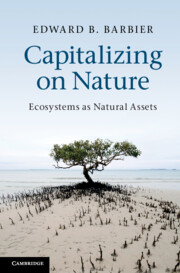Book contents
- Frontmatter
- Contents
- Figures
- Tables
- Boxes
- Acknowledgments
- Introduction
- 1 Ecological scarcity as an economic problem
- 2 Ecosystem services and ecological landscapes
- 3 The basic natural asset model
- 4 Spatial variation in ecosystems
- 5 The open economy
- 6 Ecological collapse
- 7 The way ahead
- 8 Policies in the Age of Ecological Scarcity
- Index
- References
Introduction
Published online by Cambridge University Press: 05 June 2012
- Frontmatter
- Contents
- Figures
- Tables
- Boxes
- Acknowledgments
- Introduction
- 1 Ecological scarcity as an economic problem
- 2 Ecosystem services and ecological landscapes
- 3 The basic natural asset model
- 4 Spatial variation in ecosystems
- 5 The open economy
- 6 Ecological collapse
- 7 The way ahead
- 8 Policies in the Age of Ecological Scarcity
- Index
- References
Summary
I have been interested in the problem of ecological scarcity for some time. It was, in fact, a main focus of my Ph.D. dissertation in economics in the mid-1980s, which was eventually revised and published in 1989 as the book Economics, Natural Resource Scarcity and Development: Conventional and Alternative Views. In that early book, I argued that ecological scarcity involved a fundamental tradeoff between, on the one hand, the increased economic benefits arising from development, and on the other, the ability of nature to provide ecosystem goods and services.
Today, I believe that the problem of ecological scarcity has become so pervasive worldwide that we are entering into a new era, the Age of Ecological Scarcity. In another recent book, I compare this current era with past historical periods of economic development, to show how natural resource use and exploitation has influenced patterns of economic development from the Agricultural Transition over 12,000 years ago to the present day. For example, in contrasting the beginning of the twentieth century, when Woodrow Wilson was President of the United States, to the beginning of the twenty-first century, I note how much has changed in our concerns over the environment:
In Wilson’s day, associating “natural resource abundance with national industrial strength” was the norm. Today, we no longer believe that this association holds. Instead, we see our economies and societies potentially threatened by a wide variety of constraints caused by natural resource scarcity. Such problems range from concerns over the cost and availability of key natural resources, including fossil fuel supplies, fisheries, arable land and water, to the environmental consequences of increasing global resource use, degradation of key ecosystems, such as coral reefs, tropical forests, freshwater systems, mangroves and marine environments, and the rising carbon dependency of the world economy. Contemporary unease over natural resource scarcity, energy insecurity, global warming and other environmental consequences is to be expected, given the rapid rate of environmental change caused by the global economy and human populations over the twentieth century … At the beginning of the twenty-first century, therefore, we are more accustomed to viewing “the exceeding bounty of nature” to be running out, rather than providing unlimited supplies for “our genius for enterprise.” Rather than enjoying a new “Golden Age” of Resource-Based Development, we seem to be entering a different era, the “Age of Ecological Scarcity.”
- Type
- Chapter
- Information
- Capitalizing on NatureEcosystems as Natural Assets, pp. 1 - 5Publisher: Cambridge University PressPrint publication year: 2011



